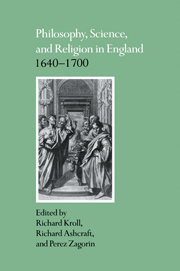Book contents
- Frontmatter
- Contents
- Notes on contributors
- Preface
- 1 Introduction
- Part I The Cambridge Platonists: philosophy at mid century
- Part II The Restoration settlement
- 7 Latitudinarianism and toleration: historical myth versus political history
- 8 The intellectual sources of Robert Boyle's philosophy of nature: Gassendi's voluntarism and Boyle's physico-theological project
- 9 Latitudinarianism and the “ideology” of the early Royal Society: Thomas Sprat's History of the Royal Society (1667) reconsidered
- 10 Locke and the latitude-men: ignorance as a ground of toleration
- 11 John Locke and latitudinarianism
- Index
8 - The intellectual sources of Robert Boyle's philosophy of nature: Gassendi's voluntarism and Boyle's physico-theological project
Published online by Cambridge University Press: 05 November 2011
- Frontmatter
- Contents
- Notes on contributors
- Preface
- 1 Introduction
- Part I The Cambridge Platonists: philosophy at mid century
- Part II The Restoration settlement
- 7 Latitudinarianism and toleration: historical myth versus political history
- 8 The intellectual sources of Robert Boyle's philosophy of nature: Gassendi's voluntarism and Boyle's physico-theological project
- 9 Latitudinarianism and the “ideology” of the early Royal Society: Thomas Sprat's History of the Royal Society (1667) reconsidered
- 10 Locke and the latitude-men: ignorance as a ground of toleration
- 11 John Locke and latitudinarianism
- Index
Summary
Robert Boyle (1627–91), an influential proponent of the new science in seventeenth-century England, articulated a philosophy of nature which has come to be the focus of considerable scholarly attention.1 Boyle's corpuscularianism, his voluntarism, empiricism, and latitudinarianism,2 as well as his considerable contemporary reputation, have made his work a convenient locus for the examination of questions about the relationships among natural philosophy, religion, and society in the turbulent period of English history and intellectual life during which he lived. Historians have variously sought the roots of Boyle's ideas in Calvinist theology, medieval voluntarism and nominalism, Old Testament imagery, and the Hermetic tradition. James R. Jacob, in a number of extended discussions, has argued that Boyle's philosophy of nature, his latitudinarianism, and the theological and philosophical underpinnings of these views resulted from his response to the ideological conflicts present in seventeenth-century English society. While all of these factors may have influenced Boyle's thought to one degree or another, the most central fact about Boyle is that he was a natural philosopher whose primary concerns were the defense of the mechanical philosophy against philosophical and theological detractors and its extension to encompass chemistry within its domain.
As a second generation mechanical philosopher, Boyle derived many of his ideas from the founding fathers of this philosophy of nature, René Descartes (1596–1650) and Pierre Gassendi (1592–1655). Many of the issues that troubled Boyle and many of the ways he conceptualized his version of the mechanical philosophy bear the mark of the debates and conflicts that surrounded the development of the mechanical philosophy earlier in the century.
- Type
- Chapter
- Information
- Philosophy, Science, and Religion in England 1640–1700 , pp. 178 - 198Publisher: Cambridge University PressPrint publication year: 1992
- 8
- Cited by

